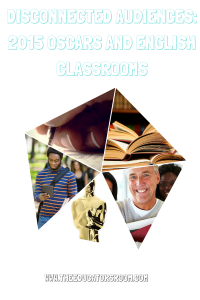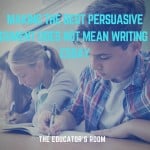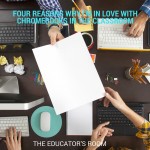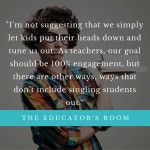 The Hollywood Academy released the 2015 nominations this past week, and their choices for best picture, best actor, and best director lit a firestorm on social media about the lack of diversity in their choices.
The Hollywood Academy released the 2015 nominations this past week, and their choices for best picture, best actor, and best director lit a firestorm on social media about the lack of diversity in their choices.
Some of the heated discussions called into question the make-up of the Academy, which according to a 2014 Los Angeles Times article is:
93 percent white
76 percent male
Average age of 63
The percentages that make up the homogenized Academy bear a striking resemblance to the make-up in the canon of literature traditionally taught in high school English classrooms, a list of works dominated by white male writers. There are numerous reasons as to why the literature is singular in gender and race: politics, economics, culture, and textbooks play a part. The most probable explanation on why the traditional canon endures, however, may be as simple as teachers teaching the books they were taught.
My observation that older white male literature dominates the curriculum is nothing new, and while there are there are glimmers of diversity, authorship bears little resemblance to readership. Occasionally, Richard Wright, Langston Hughes, and August Wilson pop up to address racial diversity, while the inclusion of Mary Shelley, Harper Lee, Jane Austen and the Bronte sisters are worthwhile contributions to gender equity.
At the same time, there is a growing body of popular young adult literature from authors representing diversity such as: Jacquelyn Woodson, Sharon Draper, Pam Muñoz Ryan, Gary Soto, and Sherman Alexie. In a manner akin to film audiences, students have been voting for these book choices with their pocketbooks or checking out library books. They are selecting materials (novels, graphic novels, animé, pop culture, biography) that they want to read.
As readers, students look for characters like themselves, who have problems like themselves, even if the settings of the stories are in the ancient past or distant future. If a student never builds empathy with a character because all the assigned reading comes from the canon, then the canon is disconnected from personal experience and useless for that student. If creating life long readers is the goal, curriculum developers must pay attention to student interests and the trends in the popular reading lists. Continuing the disconnect between the traditional canon in school and what students choose does little to build credibility.
That same kind of disconnect is seen in the nominations submitted by the Academy. Their choices show a wide gulf of opinion between critics and audiences, between the selected films and popular films at the box office. National Public Radio (NPR) film critic Bob Mondello noted the low audience numbers for many of the 2015 nominated films:
MONDELLO: If you total up all of the grosses for all of the best picture nominees this year, you come up to about 200 million, which is roughly what a picture like “Teenage Mutant Ninja Turtles” makes all by itself so that you’re talking about very few eyeballs were on those pictures.
Mondello further suggests that Academy has not supported its own self interest in making nominations:
And the idea here is that you’re not going to watch the Oscar telecast unless you have a horse in the race….And I think what they’re hoping is that the next six weeks up until the show, these movies will be seen by a lot more people. If they aren’t – and they only have 38 days to do this – then you’re going to have the lowest rated Oscars telecast in the history of the Oscars.
Encouraging people to attend the films nominated by the Academy will be a challenge, and the success of the Oscars this year will be determined by audience choice. The deaf ear of the Academy this year may make them more open to diversity in future years. In contrast, a deaf ear from curriculum developers who continue to assign literature from the canon because “it has always been taught” may result in student audiences disconnected and less interested in reading anything at all.
Hoping to bridge this disconnect are organizations such as the Children’s Book Council (CBC )Diversity Committee whose mission statement is:
We endeavor to encourage diversity of race, gender, geographical origin, sexual orientation, and class among both the creators of and the topics addressed by kid lit. We strive for a more diverse range of employees working within the industry, of authors and illustrators creating inspiring content, and of characters depicted in children’s and young adult books.
The organization We Need Diverse Books is also committed to expanding diversity in literature and in the video below, the popular YA writer Jon Green (The Fault in Our Stars, Paper Towns, Looking for Alaska) makes a compelling case for including other, newer voices into the literary canon that is taught in classrooms.
[fusion_builder_container hundred_percent=”yes” overflow=”visible”][fusion_builder_row][fusion_builder_column type=”1_1″ background_position=”left top” background_color=”” border_size=”” border_color=”” border_style=”solid” spacing=”yes” background_image=”” background_repeat=”no-repeat” padding=”” margin_top=”0px” margin_bottom=”0px” class=”” id=”” animation_type=”” animation_speed=”0.3″ animation_direction=”left” hide_on_mobile=”no” center_content=”no” min_height=”none”]
Unlike the choices made by this year’s Academy, the choices in English classroom should represent diversity in authorship, in genre, in character, and in topics because the readership is diverse. NPR’s Bob Mondello’s metaphor about engaging an audience for the Oscar show this year could be a metaphor for creating life long readers. Unless students “have a horse in the race” in what they read, they will not value the choices made for them.[/fusion_builder_column][/fusion_builder_row][/fusion_builder_container]





